 26 citations,
June 2016 in “Journal of Reproductive Immunology”
26 citations,
June 2016 in “Journal of Reproductive Immunology” Women with PCOS have higher xanthine oxidase activity linked to inflammation and heart disease risks.
 4 citations,
October 2021 in “Journal of family medicine and primary care”
4 citations,
October 2021 in “Journal of family medicine and primary care” In the Jazan region of Saudi Arabia, hair loss is common, especially among women, older people, and those with higher education and BMI. Stress, poor nutrition, and hormonal changes are key causes, but many don't seek medical help.
16 citations,
January 2022 in “International journal of molecular sciences” Certain daily habits like stress, diet, and sleep can affect the severity of hair loss in alopecia areata.
 August 2019 in “Journal of the American Academy of Dermatology”
August 2019 in “Journal of the American Academy of Dermatology” Ginseng and Albizia extracts help prevent hair thinning with age.
 November 2022 in “Journal of Investigative Dermatology”
November 2022 in “Journal of Investigative Dermatology” Aging skin cells change their lipid profiles due to stress, affecting skin health.
 April 2024 in “Cellular signalling”
April 2024 in “Cellular signalling” Activating TRPMLs helps human cells important for hair growth and increases hair growth in mice.
16 citations,
January 2018 in “International journal of trichology” Genetics and nutritional deficiencies are key factors in premature graying of hair.
 20 citations,
August 2022 in “Frontiers in Immunology”
20 citations,
August 2022 in “Frontiers in Immunology” Fibroblasts are important in healing diabetic wounds, but high sugar levels can harm their function and slow down the healing process.
 January 2019 in “Advances in stem cells and their niches”
January 2019 in “Advances in stem cells and their niches” Skin health and repair depend on the signals between skin stem cells and their surrounding cells.
 August 2024 in “Applied Sciences”
August 2024 in “Applied Sciences” Plant extracts may help prevent or reverse hair graying.
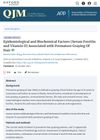 October 2021 in “QJM: An International Journal of Medicine”
October 2021 in “QJM: An International Journal of Medicine” Low iron levels are linked to premature graying of hair, but vitamin D levels are not.
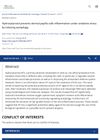 13 citations,
July 2019 in “Journal of Biochemical and Molecular Toxicology”
13 citations,
July 2019 in “Journal of Biochemical and Molecular Toxicology” Hydroxytyrosol from olive oil helps protect hair cells from damage and could prevent hair loss.
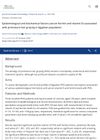 1 citations,
October 2020 in “Journal of Cosmetic Dermatology”
1 citations,
October 2020 in “Journal of Cosmetic Dermatology” Low iron levels are linked to premature graying of hair, but vitamin D levels are not.
 2 citations,
December 2021 in “Scientific reports”
2 citations,
December 2021 in “Scientific reports” Scalp hair sweating is a significant predictor of hair cortisol levels.

Lifestyle changes can improve skin health and reduce disease symptoms.
 12 citations,
September 2011 in “Archives of Dermatological Research”
12 citations,
September 2011 in “Archives of Dermatological Research” Policemen have more hair loss due to obesity, sunlight exposure, and stress.
 January 2019 in “Indian Dermatology Online Journal”
January 2019 in “Indian Dermatology Online Journal” Stress, hypothyroidism, drug intake, and anemia are important factors in women's diffuse hair loss.
 2 citations,
August 2021 in “Australasian Journal of Dermatology”
2 citations,
August 2021 in “Australasian Journal of Dermatology” Acne in adult women is often linked to polycystic ovary syndrome, especially in those who are younger, have premenstrual acne flare-ups, and irregular periods.
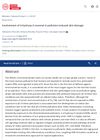 50 citations,
May 2019 in “BioFactors”
50 citations,
May 2019 in “BioFactors” Pollution increases a compound in the skin that can lead to faster aging and more inflammation.
 December 2023 in “Journal of family medicine and primary care”
December 2023 in “Journal of family medicine and primary care” Many people in Saudi Arabia experienced hair loss after COVID-19, especially women, those treated with antivirals, and those with a history of hair shedding.
 October 2005 in “CRC Press eBooks”
October 2005 in “CRC Press eBooks” Telogen effluvium is a condition where hair falls out due to various factors like illness, stress, or nutrient deficiency.
 6 citations,
May 1993 in “Archives of Disease in Childhood”
6 citations,
May 1993 in “Archives of Disease in Childhood” Children's hair loss can be caused by many factors, including autoimmune diseases, emotional stress, genetics, and infections, with treatment and prognosis varying.
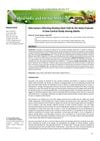 June 2023 in “Journal of Ayurvedic and Herbal Medicine”
June 2023 in “Journal of Ayurvedic and Herbal Medicine” Age, stress, and anger increase the risk of hair fall.
 1 citations,
September 2013 in “Elsevier eBooks”
1 citations,
September 2013 in “Elsevier eBooks” Hair ages and thins due to factors like inflammation and stress, and treatments like antioxidants and hormones might improve hair health.
 12 citations,
May 2017 in “Journal of Dermatological Treatment”
12 citations,
May 2017 in “Journal of Dermatological Treatment” Adult acne severity is influenced by stress, skin sensitivity, makeup, stopping oral contraceptives, and requires female-specific treatment guidelines.
 August 2024 in “The Journal of Urology”
August 2024 in “The Journal of Urology” The 2024 guideline updates recommendations for genetic testing, imaging, and sperm retrieval in male infertility.
 99 citations,
June 2005 in “Journal of Cosmetic Dermatology”
99 citations,
June 2005 in “Journal of Cosmetic Dermatology” Hair ages due to genetics and environmental factors, leading to graying and thinning, with treatments available for some conditions.
 June 2023 in “GALENICAL Jurnal Kedokteran dan Kesehatan Mahasiswa Malikussaleh”
June 2023 in “GALENICAL Jurnal Kedokteran dan Kesehatan Mahasiswa Malikussaleh” Telogen effluvium is a form of hair loss caused by various factors and requires identifying the cause for proper treatment.
 89 citations,
October 1996 in “Dermatologic Clinics”
89 citations,
October 1996 in “Dermatologic Clinics” Alopecia areata is likely caused by a combination of genetic factors and immune system dysfunction, and may represent different diseases with various causes.
5 citations,
February 2022 in “Seminars in cell & developmental biology” Recent findings suggest that genetic factors, immune system issues, and skin cell defects might contribute to the development of hidradenitis suppurativa.



























